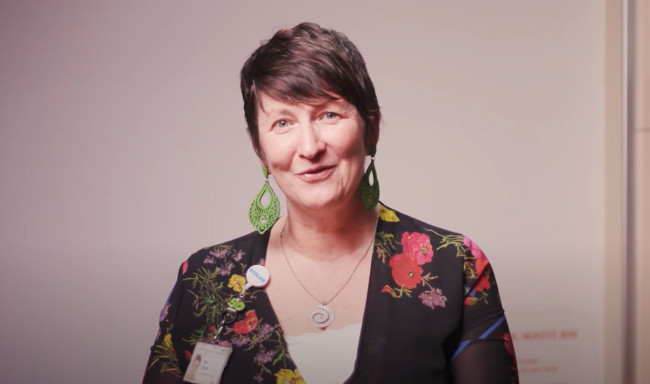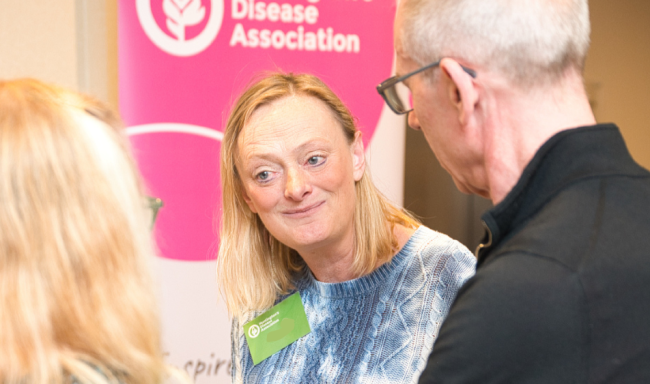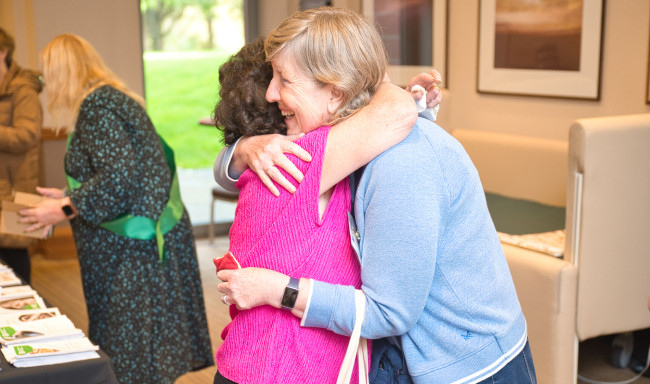Sarah is a clinical psychologist and university lecturer, and she has been working and undertaking research with people with Huntington’s for over ten years.
Sarah uses Acceptance and Commitment Therapy (or ACT) in her therapy with people with neurological and physical health conditions, and she has previously written a blog for us about why she feels this is the best option to psychologically help people affected by Huntington’s.
She has been working with the Huntington's Disease Association to develop and deliver some ACT group psychological therapies for people who have tested positive for Huntington’s, or who are caregivers of someone with Huntington’s or Juvenile-onset Huntington’s (JHD). In this article, she provides an update about the new therapies and how they are going.
We all know that Huntington’s will take a toll on even the most resilient family. Whether you carry the gene expansion for Huntington's disease, are at risk for it, or love and support someone with Huntington’s without carrying the gene expansion yourself, there are multiple pressures which can make it difficult to maintain or improve your psychological wellbeing.
I have written before about the impacts of Huntington’s on mental health, which can affect everyone in Huntington's families. Psychological support for people affected by Huntington’s can be quite hard to come by, and it can be tricky to get the “right” help for you.
For one thing, it can be difficult to find a therapist who is adequately experienced in Huntington’s, so you may end up feeling that you have to “teach” them about Huntington's before they can help you – this is a common experience reported by my clients when they speak to healthcare workers.
Many people like their therapist to feel like a wiser mind, so it can feel strange to begin from a position where you are the expert in the room. And even after that, it still may be that the therapist – through no fault of theirs – just doesn’t really understand the pressures and challenges of life affected by Huntington's disease. While they might well be a wonderful therapist in every other way, that missing bit can feel essential, and many people just really want a therapist who “understands Huntington's” from the beginning.
A second important aspect is finding someone who offers a form of therapy that makes sense for you. It probably won’t come as a surprise, given the title of this blog, that I’m a big advocate for Acceptance and Commitment Therapy (ACT). If I had to choose only one reason for that, it would be the positive focus on accepting what’s difficult in life and finding ways to live well alongside those difficulties.
ACT doesn’t tell you that your thoughts and behaviours are wrong and that changing them will bring solutions. In fact, ACT is about acknowledging that some problems can’t be solved, but then finding ways to live the best life we can despite those problems. It’s hopefully obvious why I feel this is a compassionate way to approach psychological difficulties linked to Huntington’s – since we can’t get rid of Huntington's disease, our best bet is to try and live well despite it.
Keeping Yourself in Mind
It’s been a couple of years since I spoke with Helen [Services Team Leader] and Ruth [Head of Services] from the Huntington's Disease Association, when we discussed the lack of mental health support for people affected by Huntington's, and decided to do something about it. Offering an ACT programme which was tailor-made for people affected by Huntington’s seemed like the perfect solution.
With that in mind, three group therapy programmes were designed. Each of them was made specifically to support people from a particular group affected by Huntington’s; either people who are gene-positive (but without visible or “manifest” symptoms), caregivers of someone with Huntington’s, or caregivers of someone with Juvenile-onset Huntington's (JHD). Each programme takes eight weeks, with people attending one session per week in a small group over Zoom. The same small group stays together throughout the therapy course, so generally people get to know each other quite well and it starts to feel comfortable. Each session is run by a Huntington's Disease Association Specialist Adviser, and me.
Each programme begins by helping people to become more aware, or “mindful”, of their difficult thoughts and experiences. This almost seems counter-productive, as it can hardly seem like a good idea to spend more time thinking about these upsetting things. However, this is a crucial first step to get people thinking differently about their negative emotions. Often, people come to therapy wanting to get rid of those emotions, and they find themselves struggling to do that because it’s not something we can realistically do. If you or your loved one has Huntington’s, it’s completely normal that you would feel sad, angry, anxious, or lots of other difficult emotions. Think of it as like lights on a car dashboard; we don’t like it when one lights up because it means there’s a problem to deal with, but those lights serve an important function – they tell us when there’s something we need to pay attention to. So in ACT, we aren’t trying to wipe away those emotions but to start to relate to them differently. This helps to stop them overwhelming us, so we can start to focus more on other things we care about.
We teach a set of skills to help people do that, many of which rely on developing mindful skills to attend to the thoughts and feelings we experience, and to separate ourselves from them so they don’t feel so overwhelming.
It does take time and practice, and I’m sure people are tired of hearing me say there’s no magic wand and no quick fix! But it’s like any skill – the more we practice, the better we get at it. One of the most important messages is patience, which is frustrating for people at times because they understandably want to feel better as quickly as possible. But big change doesn’t happen overnight, it takes lots of little steps in the right direction. And sometimes we trip over or have to pause for a bit, and that’s ok too – as long as we then pick ourselves up and keep moving forward.
During the ACT courses, we keep practising new skills for people to add to their toolkits, and we start to weave in another important thread too. Once we have taken a step back from these difficult emotions that are taking up all our headspace, what do we do next? This is where the idea of “values” comes in, and getting people to think about what’s most important to them in life. We get attendees to think about what makes life feel rich and meaningful for them (often people have never deliberately thought about this before). Then we work with them to think about how they can build in more of what matters to them, using that new headspace they have freed up by taking a step back from those overwhelming emotions. And we know that focusing more on what really matters is good for mental wellbeing, so all these changes start to promote better psychological health.
Is it working?
The short answer is “yes”. First of all, it’s essential to thank the people who have trusted us enough to come along and try a brand-new therapy. Everyone has shared their experiences openly and been kind and supportive to others, and without them we could not have tried the courses at all.
So far, we have found that people’s mental wellbeing has improved in various ways after joining a course. There have been substantial improvements in people’s low mood and anxiety, which is wonderful because these are important indicators that someone’s mental health has changed for the better. People are also feeling more able to focus on what matters most to them, and feeling less overwhelmed by their difficult emotions. We have even seen improvements in how people feel about their quality of life, which isn’t something we had necessarily anticipated would change as a result of the courses, but we are really delighted to see it.
We also asked questions about what it was like to attend the courses. So far, 100% of people have recommended that their course would be helpful for others, and 100% found their course positive and helpful for themselves. Everyone has also been happy with the online format, which is great news because that means we can bring people together from all over. It’s always different running therapy online compared to in person, so we were really happy to see that the online courses are going down well and feeling as if they’re working for people.
I just want to finish with two things. First, an anonymous quote from one of our attendees, which always makes me smile when I read it:
I think that probably the best bit about the course has been the ‘after the course’. When you find bloody hell, it works.” I always tell people that if our courses had a motto, “bloody hell, it works” would be it!
And second, just to repeat a huge thank you from us to the people who have attended. Because you came to the courses, because you filled in those lengthy questionnaires, we have been able to develop and keep improving these badly-needed new therapies for people affected by Huntington’s. Because of you, we can keep offering them going forward, and hopefully help more people. We really hope that the experience was as positive for you, as it was for us. Thank you.
Thank you to Sarah for providing us with this update.
Sarah previously gave a talk for the the Huntington's Disease Association on the subject of Acceptance and Commitment Therapy, so if you find this article interesting, you might like to listen to that too.




